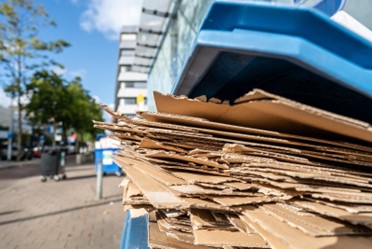5901 Botham Jean Blvd, Dallas, TX 75215
What are the Benefits of Recycling Cardboard?
September 8, 2023
Recycling cardboard is a simple yet effective way to positively impact the planet. With more than 80 billion corrugated cardboard boxes used annually in the United States alone, the potential for conservation and energy savings is enormous. Education and follow-through are the keys to a successful cardboard recycling program.
Benefits of Cardboard Recycling
Once you grasp the benefits of recycling cardboard, you’ll never throw away another box again. Here’s how this practice helps everyone:
- Save landfill space: Landfill “real estate” is limited, so it’s important to keep as many recyclables out of it as possible. Flattening and recycling cardboard boxes prevents them from needlessly taking up precious landfill space.
- Conserve natural resources: Recycling one ton of cardboard saves at least 13 trees, 380 gallons of oil, 4,000 kilowatts of electricity, and 7,000 gallons of water. In short, recycling cardboard takes 75% less energy than making new products from raw materials. This underscores the substantial environmental benefits of recycling cardboard.
- Minimize pollution: When recycled, cardboard isn’t left to decompose in landfills, where it releases methane into the atmosphere. Plus, the recycling process is less energy-intensive than producing cardboard from scratch, reducing carbon dioxide emissions to curb global warming.
- Reduce costs: Cardboard recycling lowers production costs for manufacturers, making it an economical choice for businesses and communities.
- Create jobs: Cardboard recycling supports the economy by creating jobs in the recycling and manufacturing industries, offering competitive wages and employee benefits. Transitioning to a higher recycling rate in the United States could create more than a million new jobs that benefit local economies.
How is Cardboard Recycled?
The process of recycling cardboard involves several key steps: collection, sorting, shredding, pulping, filtering, de-inking, and finally, forming the recycled material into new cardboard products. This process transforms cardboard waste into usable materials, reducing the environmental footprint associated with producing new cardboard.
However, successful recycling requires proper preparation and understanding of what can and cannot be recycled. Contaminants such as grease, food remnants, and certain coatings can compromise the recycling process, making it crucial to remove non-recyclable components and check whether the cardboard is clean before recycling. Educating the public about these requirements is vital for maximizing recycling effectiveness.
Recycle Cardboard at Okon Recycling
Based in Dallas-Fort Worth, TX, Okon Recycling is committed to sustainability and strong customer relationships. Our fourth-generation family business was founded over 100 years ago and currently offers a wide range of recycling services on the local, national, and international levels. We aim to pave the way for a cleaner and more sustainable future by keeping millions of pounds of recyclable products out of landfills. With the ability to accommodate both large and small recycling projects, we’re confident we can meet your needs, whether you’re a member of the public, commercial, or industrial sectors. Contact us at 214-426-6566 to learn more about the benefits of recycling cardboard boxes in the DFW area as you strive to contribute to a greener future.
